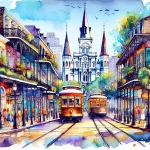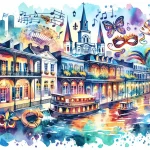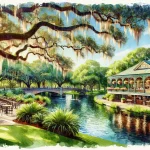New Orleans holds the prestigious distinction of being the birthplace of opera in America. In 1796, while Josephine married Napoleon and Jane Austen penned Pride and Prejudice, the city under Spanish rule witnessed its inaugural opera performance of André Ernest Grétry’s “Sylvain.” This pivotal event marked the beginning of New Orleans’ reign as the “Opera Capital of North America,” a title it would maintain for over a century.
In This Article
TL;DR
- New Orleans established itself as the pioneering city to host opera performances in the United States, commencing in 1796.
- Opera played a vital role in shaping the city’s cultural and social fabric, becoming a beloved art form deeply intertwined with its identity.
- Today, opera remains accessible and celebrated in New Orleans through various companies, venues, and community outreach initiatives.
Historical Emergence of Opera in New Orleans
Overview of the early opera scene in the late 18th century
In the final decade of Spanish colonial rule, New Orleans embraced opera as an emerging art form. The Théâtre St. Pierre, opened in 1792, hosted the city’s inaugural documented opera performance on May 22, 1796, with Grétry’s “Sylvain.” This marked the beginning of an almost unbroken tradition of opera in the city.
The role of the French and Spanish influences in shaping the opera culture
The French and Spanish influences were instrumental in shaping New Orleans’ opera culture. The Théâtre St. Philippe, opened in 1808, presented the American premiere of Étienne Méhul’s “Une Folie,” expanding the repertoire to include works by French composers like Grétry, Méhul, and François Boieldieu.
First opera performances and the establishment of opera houses
As the 19th century progressed, various theaters opened and closed, gradually expanding the repertoire to include Italian composers like Giovanni Paisiello and Luigi Cherubini. The Théâtre d’Orléans, inaugurated in 1815, became a hub for opera, introducing the latest European works to American audiences through premieres.
Pioneering Figures and Contributions
Key figures in the development of New Orleans opera (composers, performers)
Influential figures like impresario John Davis and his son Pierre played pivotal roles in importing singers, musicians, and dancers to New Orleans, shaping the city’s opera scene. Renowned performers such as Enrico Caruso, Luciano Pavarotti, and Beverly Sills graced the stages of New Orleans, while Plácido Domingo began his professional career here in 1962.
Contributions of immigrants and diverse communities to the opera scene
New Orleans’ diverse communities contributed significantly to the opera scene. The arrival of “Madame” Lecompte’s famed ballet company, including Jean and Marius Petipa, introduced new techniques and choreography that influenced 19th-century ballet music.
Influence of local musicians and cultural icons on opera
Local musicians and cultural icons left an indelible mark on New Orleans’ opera tradition. The city’s unique musical heritage, blending various cultural influences, found its way into opera performances, adding a distinct flavor to the art form.
Architectural Marvels: Opera Houses of New Orleans
Historical significance of the French Opera House
The French Opera House, constructed in 1859, became the epicenter of New Orleans’ social life and a symbol of the city’s operatic legacy. This iconic theater hosted American premieres of works by European masters like Verdi, Rossini, and Bellini, cementing New Orleans’ status as the “Opera Capital of North America.”
Architectural styles and influences seen in opera house designs
The opera houses of New Orleans showcased a blend of architectural styles and influences. The French Opera House, for instance, featured a grand design that reflected the city’s French heritage and the opulence associated with the art form.
Restoration and current status of these iconic buildings
While some historic opera houses succumbed to fires, efforts have been made to restore and preserve these architectural marvels. The French Opera House, though destroyed in 1919, remains a cherished part of New Orleans’ cultural heritage, with its legacy carried on by modern venues.
Opera’s Role in Mardi Gras and Other Festivals
Integration of opera in Mardi Gras festivities
Opera has been seamlessly woven into the fabric of New Orleans’ vibrant festival culture, including the world-renowned Mardi Gras celebrations. Operatic performances and themes have often been incorporated into the festivities, adding a touch of grandeur to the revelry.
Opera performances during major cultural festivals and events
Beyond Mardi Gras, opera has graced the stages of various cultural festivals and events in New Orleans. From outdoor performances to grand galas, these events showcase the city’s enduring love for the art form and its commitment to preserving its operatic heritage.
How opera contributes to the unique identity of New Orleans festivals
Opera’s presence in New Orleans festivals contributes to the city’s unique cultural identity. The fusion of opera with other art forms and traditions creates a one-of-a-kind experience that celebrates the city’s rich tapestry of influences and its unwavering spirit of celebration.
Educational and Community Outreach Programs
Opera-based educational programs in local schools and universities
To ensure the legacy of opera continues, New Orleans has implemented educational programs in local schools and universities. These initiatives aim to introduce students to the art form, fostering appreciation and nurturing future generations of opera enthusiasts.
Community initiatives to promote opera among diverse audiences
Recognizing the importance of accessibility, various community initiatives have been launched to promote opera among diverse audiences. From free outdoor performances to discounted tickets, these efforts strive to make opera inclusive and accessible to all.
Partnerships with local organizations to enhance cultural literacy through opera
Collaborations with local organizations have played a crucial role in enhancing cultural literacy through opera. These partnerships facilitate educational workshops, lectures, and immersive experiences that deepen the community’s understanding and appreciation of this art form.
Opera Today: Modern Performances and Venues
Current opera companies and their seasonal offerings
New Orleans is home to several opera companies that continue to captivate audiences with their seasonal offerings. From classic masterpieces to contemporary works, these companies showcase the enduring appeal and evolution of opera.
Description of modern venues hosting opera performances
While historic opera houses hold a special place in the city’s heart, modern venues have emerged to host opera performances. These state-of-the-art facilities provide exceptional acoustics and amenities, ensuring a memorable experience for audiences.
Accessibility and inclusivity in contemporary opera productions
Contemporary opera productions in New Orleans prioritize accessibility and inclusivity. Efforts are made to reach diverse audiences through affordable ticket pricing, inclusive programming, and community engagement initiatives, ensuring that opera remains a beloved art form for all.
Economic and Cultural Impact of Opera in New Orleans
Contribution of opera to the local economy and tourism
Opera has played a significant role in boosting New Orleans’ local economy and tourism industry. Performances and festivals attract visitors from around the world, generating revenue and supporting local businesses.
Opera’s influence on New Orleans’ global cultural reputation
New Orleans’ rich operatic heritage has contributed to its global cultural reputation as a city that celebrates and preserves the arts. This reputation has further enhanced the city’s appeal as a cultural destination, attracting art enthusiasts and connoisseurs from around the world.
Future prospects of opera in enhancing cultural heritage and tourism
As New Orleans continues to embrace its operatic legacy, the future prospects of opera in enhancing the city’s cultural heritage and tourism industry remain promising. Ongoing efforts to preserve and promote this art form will undoubtedly solidify New Orleans’ position as a premier destination for opera lovers and cultural enthusiasts alike.
Expert Insights and Future Outlook
Interviews with opera historians, performers, and cultural critics
To gain a comprehensive understanding of New Orleans’ operatic legacy and its future, insights from opera historians, renowned performers, and cultural critics have been invaluable. Their perspectives shed light on the challenges, triumphs, and potential opportunities that lie ahead.
Analysis of trends and future directions in the opera scene in New Orleans
By analyzing current trends and future directions in the opera scene, experts have identified areas for growth and innovation. From embracing new technologies to exploring diverse programming, the opera community in New Orleans is poised to adapt and evolve, ensuring the art form remains relevant and engaging for generations to come.
Potential challenges and opportunities for the growth of opera in the city
While challenges such as funding, audience engagement, and preserving historic venues persist, New Orleans’ opera community remains resilient and committed to overcoming these obstacles. Opportunities for growth lie in fostering partnerships, embracing inclusivity, and leveraging the city’s unique cultural heritage to attract new audiences and nurture emerging talent.






